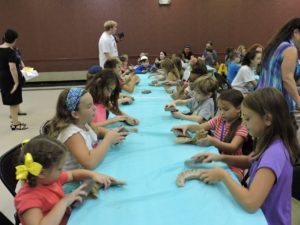
LBSY students prepare their own shofars during a 2018 school event – before the pandemic. Religious school officials say classes are slowly returning to the in-person format after more than a year of virtual education. (LBSY photo)
By Michael Ginsberg
For Community
When the COVID pandemic reached Louisville in early 2020, the leaders of the city’s Hebrew schools responded the same way as most other U.S. educators: They switched to virtual learning and scrambled to find ways to salvage the rest of the school year.
Today, they are gradually reopening their doors to students and feeling cautiously optimistic.
There was little optimism in 2020.
“We were hard pressed to do activities that would keep the kids engaged and remembering they were Jewish,” said Bev Weinberg, head of school for LBSY (Louisville Beit Sefer Yachad, Hebrew for “School Together”), which serves students from Adath Jeshurun, Keneseth Israel and Temple Shalom.
Weinberg said instruction improved last year, with one caveat:
“The instruction that was going on last year – the platforms – were top-notch,” Weinberg said. “We’ve done all kinds of activities: drive-throughs, online, delivering materials, in order to continue to have a sense of community and connection with these kids. But, if the children didn’t have someone at home monitoring them, they lost the year.”
Weinberg is more optimistic this year, even though LBSY classes continue to operate remotely until its school board determines otherwise.
“Our virtual classes are going well,” she said. “We’re doing whatever we’ve been able to do and still stay safe and educational.”
Sarah Harlan, principal of both the High School of Jewish Studies and The Temple, echoed Weinberg’s assessment of the improvement last school year and the startup this year. Attendance actually increased last year, she said.
This school year, The Temple started with Grade 7 and 8 students in person for the first few weeks, brought the Grades 4-6 students back for Wednesday Hebrew School on Oct. 13 and the Kindergarten-Grade 6 students back in person on Sunday, Oct. 17. The High School of Jewish Studies had its first in-person session on Oct. 24.
Successful innovations last year bode well for the future, Harlan said. Among them, the recruitment of expert guest speakers remotely, including rabbinical students from around the country.
“We were able to bring in some amazing teachers who don’t live here,” she said. “Do I think that’s the best way to teach? Obviously not. But we did it and were still able to connect. I was proud of what we were able to do.”
David Bryfman, chief executive officer of the Jewish Education Project, a support organization for teachers in the Jewish sector, said the lockdown forced many students that had shunned online classes to embrace them.
Citing a study of adult Jewish students, Bryfman wrote, “there was a clear indication that as a result of the shift to online learning during the pandemic, the majority of these learners are interested in making online learning a prominent part of their weekly adult Jewish learning.”
While Hebrew schools and adult education have weathered the COVID storm, the report card is less encouraging for the general school population, as reflected in a survey Voice of the Educator
According to the report, more than half of K-12 teachers in public schools queried said the pandemic and shift to virtual learning resulted in a “significant” learning loss for students, academically, socially and emotionally.
Which means, the report concluded, “nothing beats being in a classroom.”



